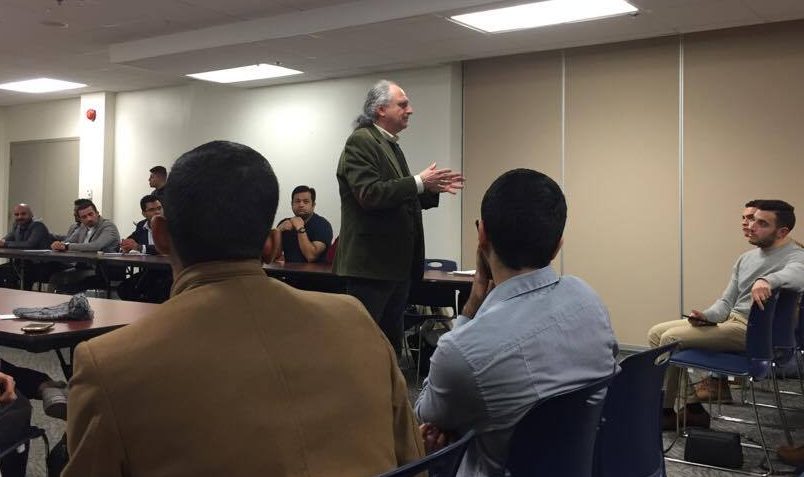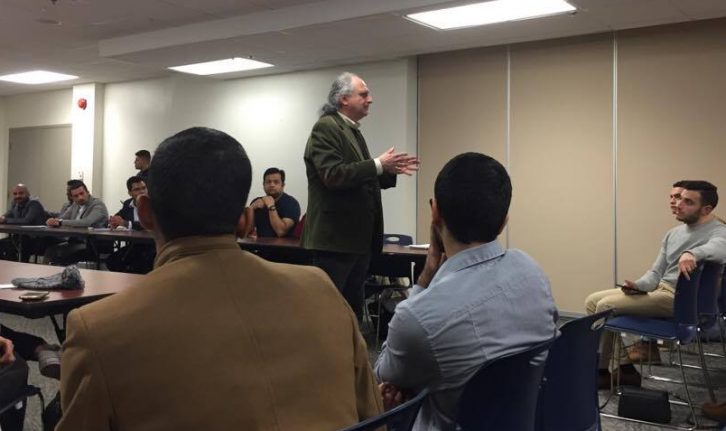Immigration
Stories of love, hope and desperation arise in Q&A session on immigration
Lawyer Lee Cohen answers questions for students who can't afford consultations

caption
Lee Cohen answers a students question
caption
Lee Cohen answers a student’s question.Prominent immigration lawyer Lee Cohen had one main piece of advice for his audience on Thursday night: don’t listen to friends or family members on immigration issues — talk to an expert.
“One mistake can be fatal,” he said. “If you’re in the refugee domain, it can literally be fatal.”
Cohen answered questions for a crowd of over 60 people, mostly students, who were there to seek out his advice about immigrating to Canada. The event, hosted by Fusion Halifax and Enactus Dalhousie, was held at the Student Union Building at Dalhousie University. Related stories
Many people wanted to share their stories with Cohen. He repeated over and over that his answers were broad and incomplete, without knowing the full details of each person’s situation.
One woman asked what was the best way for her fiancée to move to Canada. The fiancée is studying in the United States and will graduate next year.
“Marry him,” Cohen responded, and the room burst into laughter. “I have clients who say ‘we’re going to get married sooner or later,’ and I say, ‘make it sooner.’”
Cohen also stressed that they would have to prove the marriage is genuine through details like how long had they been a couple.
“Don’t laugh at this,” the woman asked of the room. “We’ve been together since we were 14.” The audience didn’t laugh — they applauded.
One man asked if he would be able to sponsor his disabled brother.
Cohen said siblings don’t count as family members under immigration law and can only be sponsored under very specific circumstances. The only family members that people can sponsor are dependent children, spouses, parents and grandparents.
It is also harder to sponsor parents and grandparents today than it was 10 years ago, Cohen said. The previous federal government increased the time and financial criteria necessary to sponsor a parent or grandparent.
Harper’s legacy
Former prime minister Stephen Harper’s rule changes were a main theme of Cohen’s talk. Before 2014, Cohen said, a dependent child was any child aged 22 or younger and children older than 22 who were in school. But the age was reduced to 19, and the exception for education was removed.
Cohen said this was an effective way of discouraging potential immigrants who did not want to break up their family. He said it was the kind of law Prime Minister Justin Trudeau promised to overturn, but has yet to do.
“I’ve never said this in public before, but I believe the Trudeau government … is being educated by old, established, entrenched, unproductive and uncreative bureaucracy,” he said.
Ali Algermozi, director of the immigration and diversity action team for Fusion, said Thursday’s event was held to help people who couldn’t afford to meet one-on-one with a lawyer.
“I think it went really well; just as expected, we had the room full and people were very engaged,” he said. “We had to go an extra half an hour for people to get some extra questions out, and Lee Cohen is still very kind with his time in answering questions as well.”
Effect on Nova Scotia
According to Cohen, there are two main issues to consider with regards to immigration: security and race.
Cohen told many stories about the racially charged language people use to oppose racism. He has received hate mail, including anti-Semitic hate mail, for bringing in “those people.”
Cohen thinks these attitudes are holding Canada back, and that provinces will benefit with more people. He said he believes that, for Nova Scotia to be taken seriously as a province, it needs a population of at least 2 million people, and Halifax needs at least 650,000. At this moment those numbers are below a million and 500,000, respectively.
Layla’s story
Cohen repeatedly explained how his answers would have differed 10 years ago, when there were more categories for immigration and less convoluted laws.
Layla Youssef, the associate director of Fusion’s immigration team and one of the event’s organizers, explained in an interview after the event how she was almost deported from Canada because of one of those laws. When she applied for her post-grad work permit last year, she included the fee in the envelope instead of providing a receipt for an online payment. Unbeknownst to her, this disqualified her from the application process. She said she wasn’t notified of this refusal until three months later and at that point her status in Canada had expired.
“There was no option for me to stay,” she said. “If you have no status you can’t stay in the country.”
Youssef hired Cohen to help her. He advised her to apply for a humanitarian exception, since she was disqualified by an honest mistake and was not notified in time to correct it. The process took six months. Youssef said it was a difficult time for her and her brother, who also made the same mistake.
“I had no way I could work anywhere. I didn’t even have a visitor visa,” said Youssef. “I couldn’t open my business; I can’t do anything.”
It was a long and difficult wait, but thanks to Cohen’s help she was eventually allowed to stay in the country and find work. She now has a stable job at TD Insurance.

